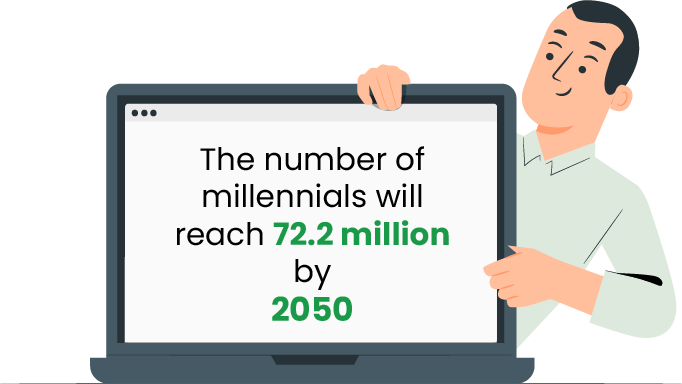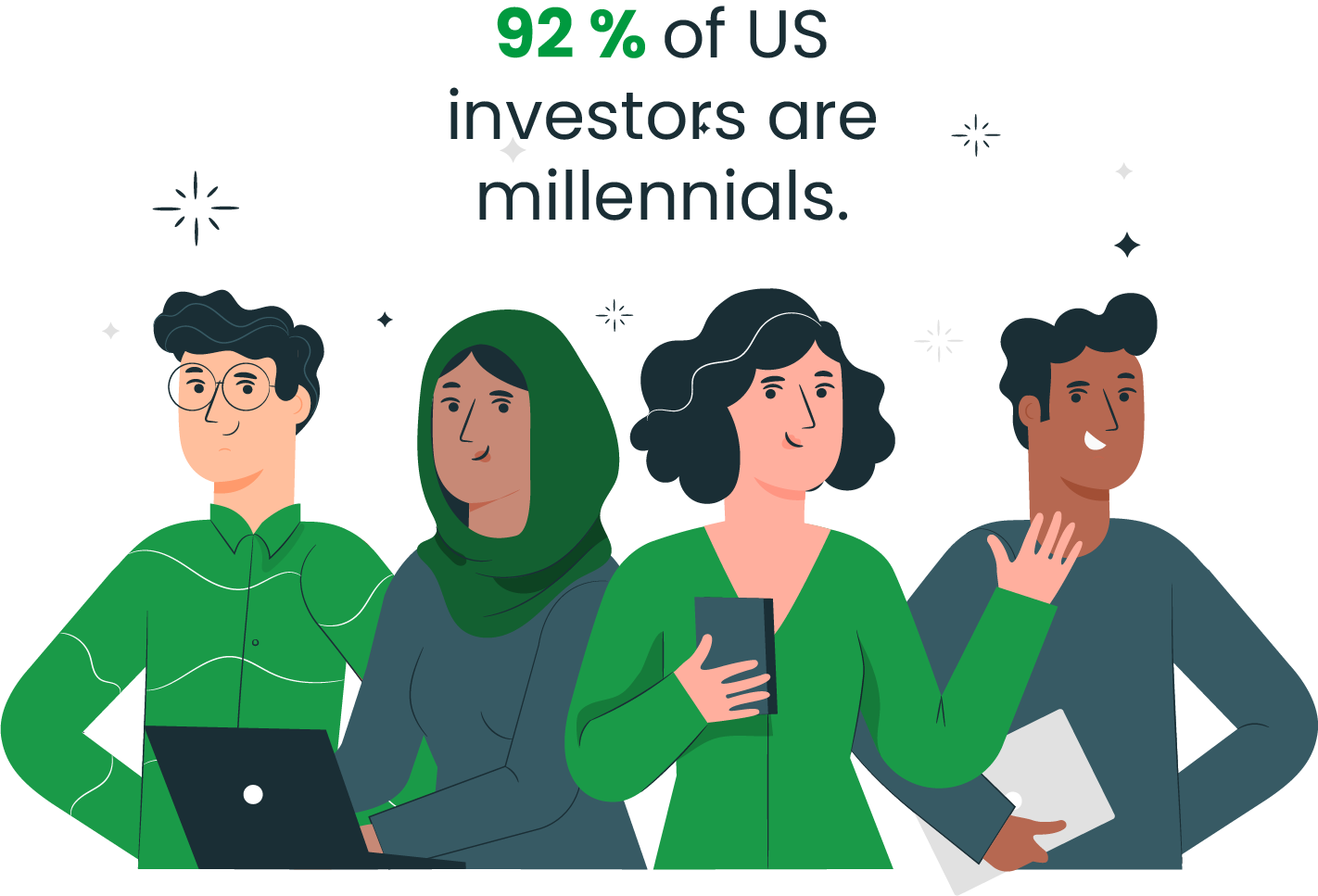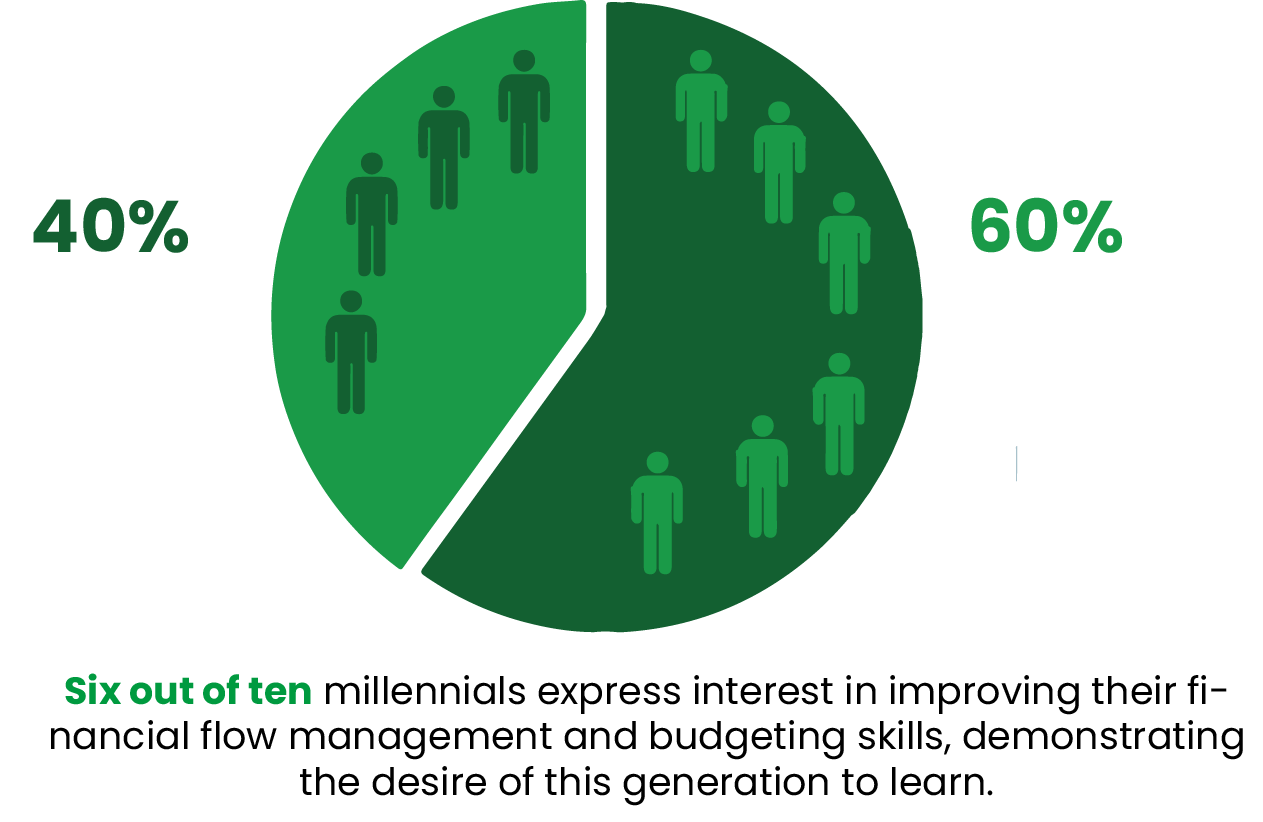How Do Millennials Spend Their Money? Key Statistics You Need To Know in 2023

Millennials are the third-largest living generation in the U.S. by population. Born between 1981 and 1996, the millennial population is expected to peak in 2033 at 74.9 million as immigration adds more people to this cohort than any other. It is anticipated that the number of millennials will reach 72.2 million by 2050, making up the majority of the labor force.

By 2025, millennials' income will reach $8.3 trillion, increasing their purchasing power from the $1 trillion they currently spend. Because of their growing purchasing power, it's no surprise that companies continue to hone methods to entice millennials to spend.
We have compiled a list of the most significant millennial spending statistics you need to know in 2022.
Key Takeaways
- 92% of U.S. investors are millennials.
- By 2025, millennials' income will reach $8.3 trillion.
- 45% of millennials are willing to use Google's investing possibilities.
- Millennials are looking to buy homes with a median price of $250,000 up to $315,000.
- Millennials have the highest overall median income of all generations, making $206,600 after just eight years.
- Millennials' average 401(k) plan balance was $2,000, and just 11.4% of them had one.
- With 74% of their dollar contributions going into Roth IRAs (after-tax Individual Retirement Accounts), millennials are doubling down on IRA contributions.
Millennials and Technology
Wealth management companies should prepare to develop a different client experience for this group now, considering their love for technology and their desire for self-directed investing. But even within a demographic, a one-size-fits-all client experience is ineffective in today's digital age.
Use of Technology for Investments
About 92% of U.S. investors are millennials, and 67% of them want robo-recommendations as a fundamental element of their investing portfolio. A self-directed investment site with adviser access is desired by 66% of them, while a mobile platform that connects users directly to advisers is preferred by 63% of millennials. In addition, 65% of millennials want gamification to increase their investing knowledge and maintain greater engagement with their portfolio.
Compared to three out of ten Gen Xers, five out of ten millennials prefer to adapt investment research and education materials to meet their needs. After growing up with popular tech brands, 45% of millennials say they are willing to use alternatives like Google's investing possibilities.

Technology and Finances
Financial topics are very important to millennials, and when mixed with technology, millennials say they know exactly what they need. Fifty percent (50%) of millennials want to be able to customize their apps' look and feel, and 62% prefer a platform that uses sentiment indexes and social media to make financial recommendations.
For better suggestions, 67% of millennials want software that allows real-time tracking of transactions, payments, and other financial data. Six out of ten millennials express interest in improving their financial flow management and budgeting skills, demonstrating this generation's desire to learn.

Housing and Mortgages
Millennials are significant due to their numbers and economic power. However, like every generation before them, they are bringing change. Millennials are treating and approaching the home-buying process in a completely fresh, modern way, which may affect the economy as a whole in the future.

Millennials hold the highest (and growing) share of home buyers, at 43%. Older millennials (aged 32 to 41 in 2022) make up about 25% of the house-buying population, whereas younger millennials (aged 23 to 31) make up 18%. And when it comes to first-time homeowners, more than any other generation, millennials are on top, with 48% of older millennials and 81% of younger millennials owning their homes.
On the other hand, even though 89% of millennials want to be homeowners at some point in their life, 65% know that it will take up to five years to become one. And of the 58% who own a home, 83% were able to afford it through a mortgage. While a mortgage can be helpful, 8% of millennials said that the process itself was seen as the most challenging part of homeownership. Nonetheless, 10% of millennials (aged 23 to 41) managed to finance 100% of the purchase price with a mortgage. As for pricing, millennials are likely to purchase a home with a median price of $250,000 up to $315,000.
Millennials and Shopping
This generation grew up in tandem with technology. Because of this, millennials are the most likely to shop online, with a penetration rate of 86.2%. As it turns out, millennials struggle daily with the temptation of internet purchases. More than four in five (82%) will make a purchase the first time they see an item if they like it enough.
The effect of influencer elements, including articles and blogs, Instagram personalities, and celebrity endorsements, is felt by 72% of millennials. Services like Buy Now, Pay Later plans are used by 30.3% of millennials, while word of mouth and online customer reviews are preferred by older generations, which could be why they are less impacted by external sources.
Moreover, millennials spend more money on conveniences and comforts. For a single coffee, 60% of them are willing to pay more than $4. For food, 70% of millennials say they are willing to spend a little more to eat at trendy local spots. Over 50% of millennials spend money on cabs and 69% purchase clothing for reasons other than fundamental necessity.
Here is where millennials spend more annually:
One fun fact about millennials is that they love to focus on experiences. In the upcoming year, 72% of respondents said they would prefer to spend more money on experiences rather than tangible possessions, indicating a shift away from materialism and an increased desire for authentic experiences. However, "experiences" cost more money than products, generally speaking.
Nevertheless, more than seven in ten millennials (78%) would rather spend money on a desirable experience or event than on a desirable product, and 55% of millennials report spending more money than ever before on events and live experiences. Not surprisingly, more than eight in ten millennials (82%) attended or participated in a range of live events in the last year, more so than other older generations (70%), including parties, concerts, festivals, performances, races, and themed sports.
Still, statistics also reveal that they have the highest overall median income of all generations, making an average of $206,600. Although they are cost-conscious, they will pay more for convenience and quality.
Millennials and Retirement
According to 82% of millennials, the COVID-19 pandemic and current inflation have changed their attitudes regarding retirement savings. Seventy percent (70%) of millennials are anxious and stressed out about saving for retirement. Forty-three percent (43%) express concern about retiring and being unable to provide for their family's essential needs. Their average 401(k) plan balance is predicted to be $2,000, with only 11.4% of them having a 401(k) at all.
Nonetheless, millennials are starting to become more invested and interested in their retirement -- 14% of millennial workplace savers are planning to invest in a target date fund soon, and 38% of millennial savers don't intend to switch from a target date fund. Additionally, millennials have increased their IRA (Individual Retirement Account) contributions, with 74% of their dollar contributions going into Roth IRAs.
